Typed Tagless Final Bioinformatics
Sebastien Mondet (@smondet)
See also the PDF version, and the PDF handout.
Context
Seb: Software Engineering / Dev Ops at the Hammer Lab.

Ketrew/Biokepi
Was here 2 years ago to present:
- Ketrew: a workflow engine for complex computational pipelines.
- EDSL/library to write programs that build workflows/pipelines
- A separate application, The “Engine”, orchestrates those workflows
- Biokepi: a library of Ketrew “nodes” for Bioinformatics.
Ketrew/Biokepi/Epidisco/PGV …
Now
- Used with GCloud/Kubernetes, AWS, YARN (incl. Spark).
Tyxml_js+reactWebUI- Personalized Genomic Vaccine clinical trial (NCT02721043) →
hammerlab/epidisco/
WebUI ⇒ 3.6 MB GIFs
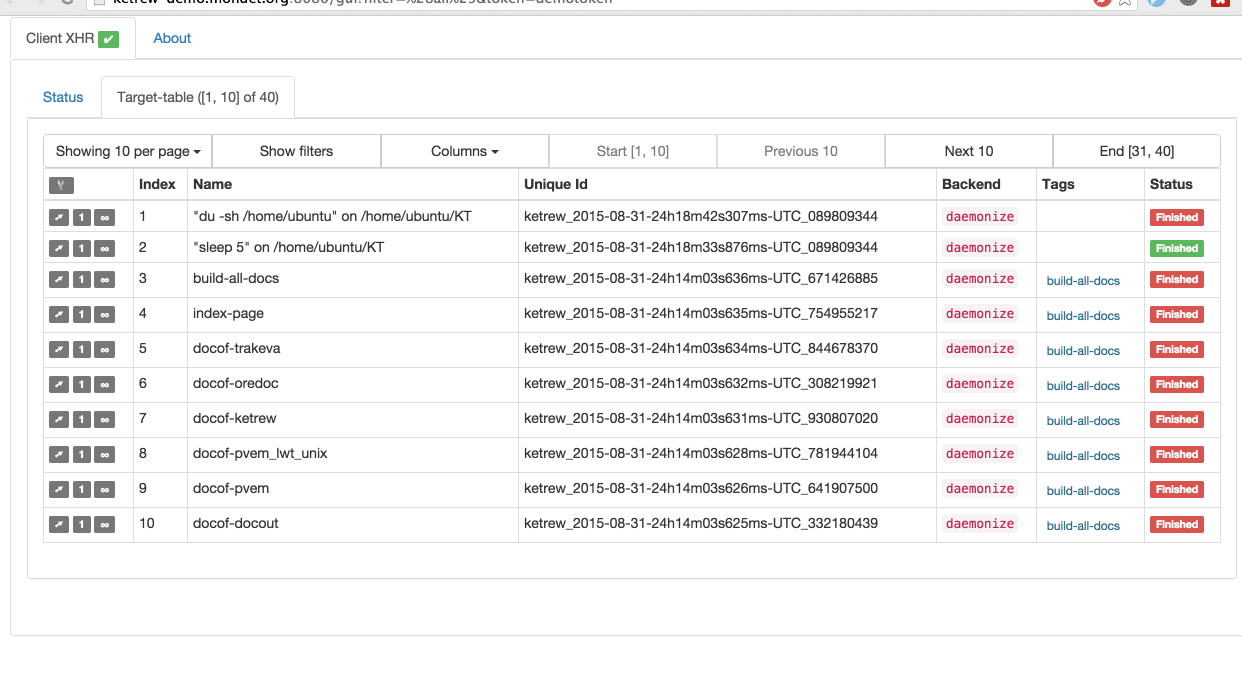
The 1st Time, We Presented:
Cool experiment: GADT-based, very high-level pipeline EDSL.
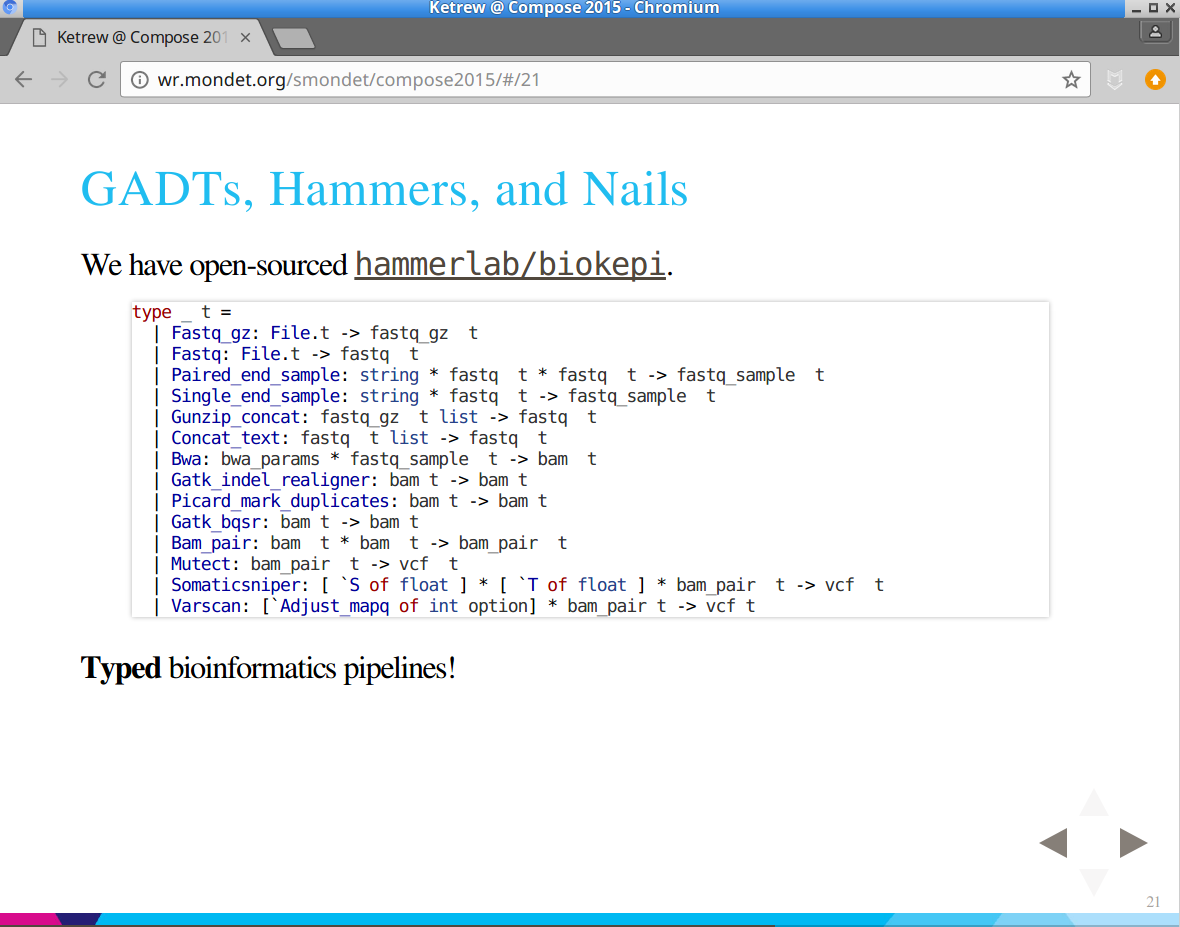
Then, At OCaml / ICFP 2015
Cool experiment: add tools / tool-kinds:
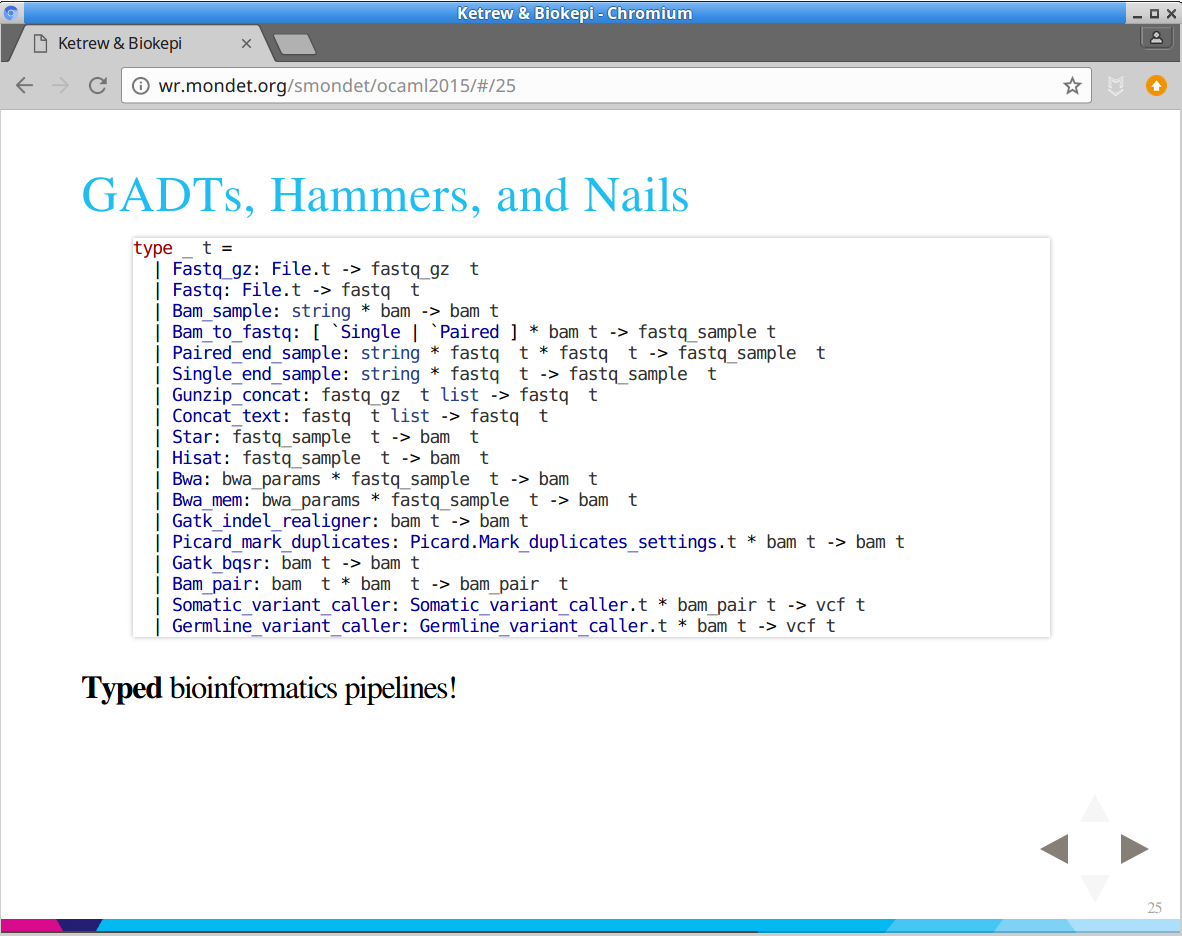
And Soon After
Kept growing, became the default…
type _ t =
| Fastq_gz: File.t -> fastq_gz t
| Fastq: File.t -> fastq t
| Bam_sample: string * bam -> bam t
| Bam_to_fastq: [ `Single | `Paired ] * bam t -> fastq_sample t
| Paired_end_sample: fastq_sample_info * fastq t * fastq t -> fastq_sample t
| Single_end_sample: fastq_sample_info * fastq t -> fastq_sample t
| Gunzip_concat: fastq_gz t list -> fastq t
| Concat_text: fastq t list -> fastq t
| Star: Star.Configuration.Align.t * fastq_sample t -> bam t
| Hisat: Hisat.Configuration.t * fastq_sample t -> bam t
| Stringtie: Stringtie.Configuration.t * bam t -> gtf t
| Bwa: Bwa.Configuration.Aln.t * fastq_sample t -> bam t
| Bwa_mem: Bwa.Configuration.Mem.t * fastq_sample t -> bam t
| Mosaik: fastq_sample t -> bam t
| Gatk_indel_realigner: Gatk.Configuration.indel_realigner * bam t -> bam t
| Picard_mark_duplicates: Picard.Mark_duplicates_settings.t * bam t -> bam t
| Gatk_bqsr: (Gatk.Configuration.bqsr * bam t) -> bam t
| Bam_pair: bam t * bam t -> bam_pair t
| Somatic_variant_caller: somatic Variant_caller.t * bam_pair t -> vcf t
| Germline_variant_caller: germline Variant_caller.t * bam t -> vcf t
| Seq2HLA: fastq_sample t -> seq2hla_hla_types t
| Optitype: ([`DNA | `RNA] * fastq_sample t) -> optitype_hla_types t
| With_metadata: metadata_spec * 'a t -> 'a tVery Concise Pipelines
let crazy_example ~normal_fastqs ~tumor_fastqs ~dataset =
let open Pipeline.Construct in
let normal = input_fastq ~dataset normal_fastqs in
let tumor = input_fastq ~dataset tumor_fastqs in
let bam_pair ?gap_open_penalty ?gap_extension_penalty () =
let normal =
bwa ?gap_open_penalty ?gap_extension_penalty normal
|> gatk_indel_realigner |> picard_mark_duplicates |> gatk_bqsr in
let tumor =
bwa ?gap_open_penalty ?gap_extension_penalty tumor
|> gatk_indel_realigner |> picard_mark_duplicates in
pair ~normal ~tumor in
let bam_pairs = [
bam_pair ();
bam_pair ~gap_open_penalty:10 ~gap_extension_penalty:7 ();
] in
let vcfs =
List.concat_map bam_pairs ~f:(fun bam_pair ->
[
mutect bam_pair;
somaticsniper bam_pair;
somaticsniper ~prior_probability:0.001 ~theta:0.95 bam_pair;
varscan_somatic bam_pair;
strelka ~configuration:Strelka.Configuration.exome_default bam_pair;
])
in
vcfsType Information
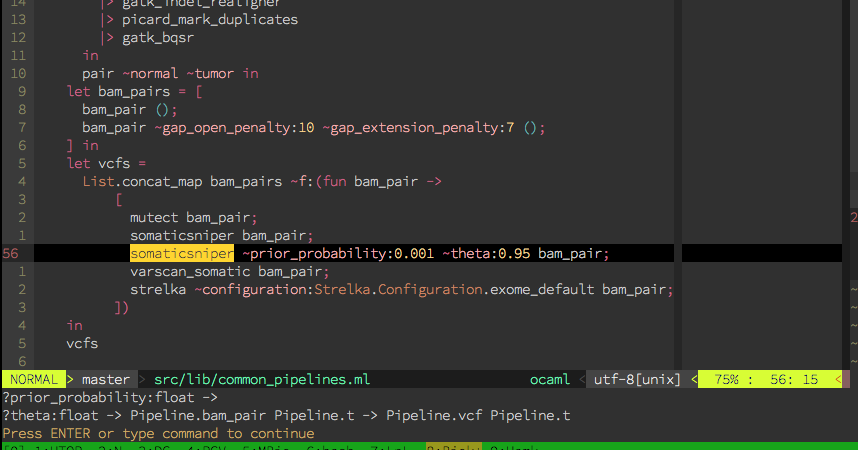 {Merlin + Biokepi}
{Merlin + Biokepi}
There's a “But”
Fancy but not that practical:
Pipeline.tis getting too big- Just
compile_aligner_stepis about 170 lines of pattern-matching - Still missing proper
lambda/apply, list functions, etc.
- Just
- Not Extensible
- Adding new types is pretty annoying.
- Optimization passes need to deal with whole language at once, always.
- Optimization are not proper language transformations.
Try Again
We want what we already have + users of the library to be able to:
- Extend the language to their needs
- Re-use default compilers when implementing theirs
- Write future-proof optimizations
- Do transformations “by hand” if easier than an optimization pass
Not-Really Extensible Hacks
Tried a few experiments:
- extensible types
- loose a lot of the type-strength benefits
- are not that extensible
- basic “language” based-on GADTs and extensible bioinformatics atoms
- could have worked further but not really extensible either
Oleg
“We trivially solved that problem 20 years ago!”
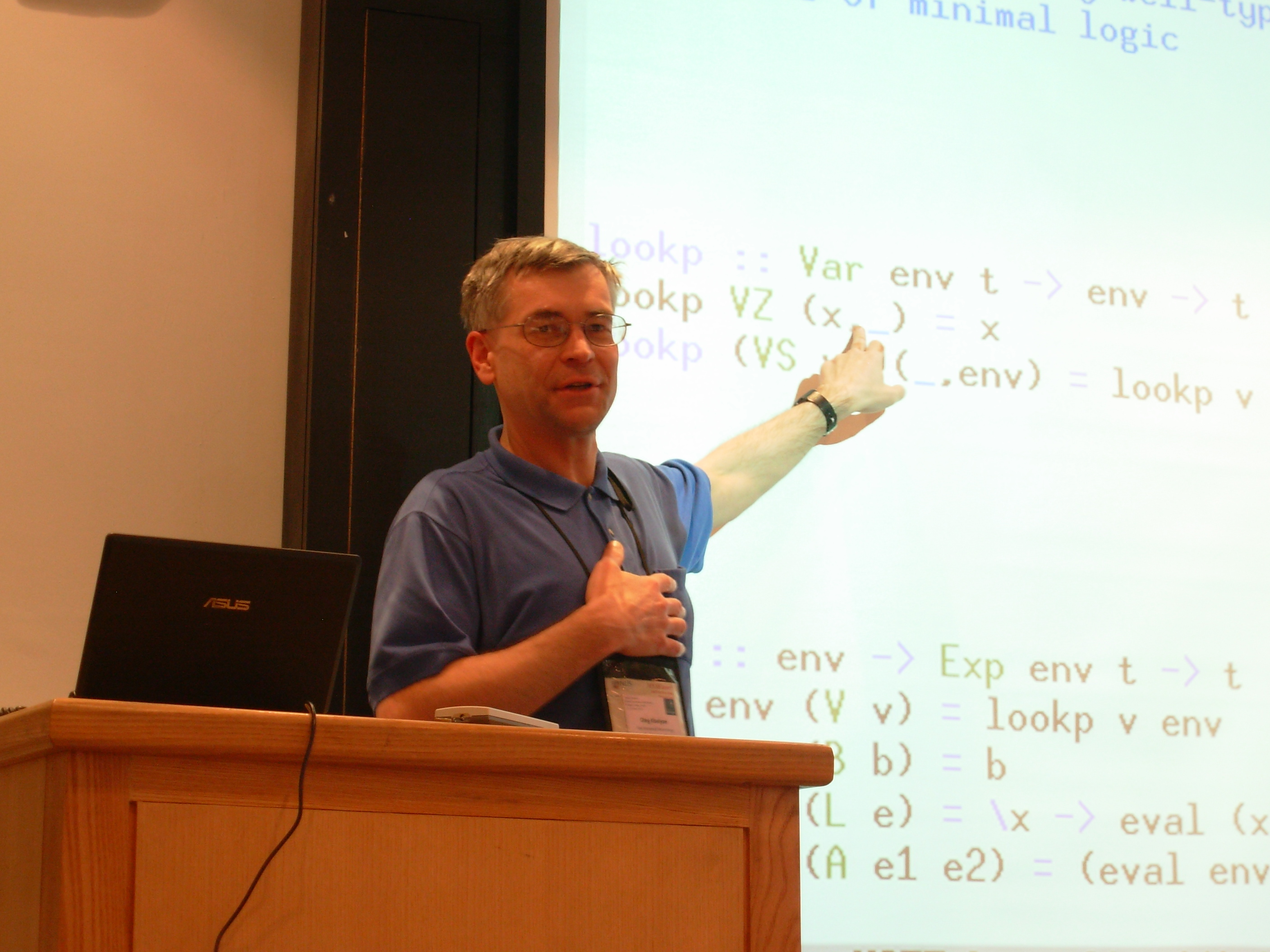
QueΛ and The Course Notes
First:
- Oleg Kiselov emailed the OCaml mailing-list on 2015-07-15
“The library makes SQL composable, however odd it may seem.” - Presenting “QueΛ”, first just some
.tar.gzand draft paper; then it got to PEPM'16 →DOI:2847538.2847542). - Asked the author for an actual repo and licence
→bitbucket.org/knih/quel. - It uses modules and the EDSL is well typed.
Get Ready
@pveber pointed us to Oleg's course:
- In Haskell (very concise code, very un-modular).
- Well explained and progressive.
⇒ Follow the course; with QueΛ's help; in a Biokepi-like setting.
And We Did It
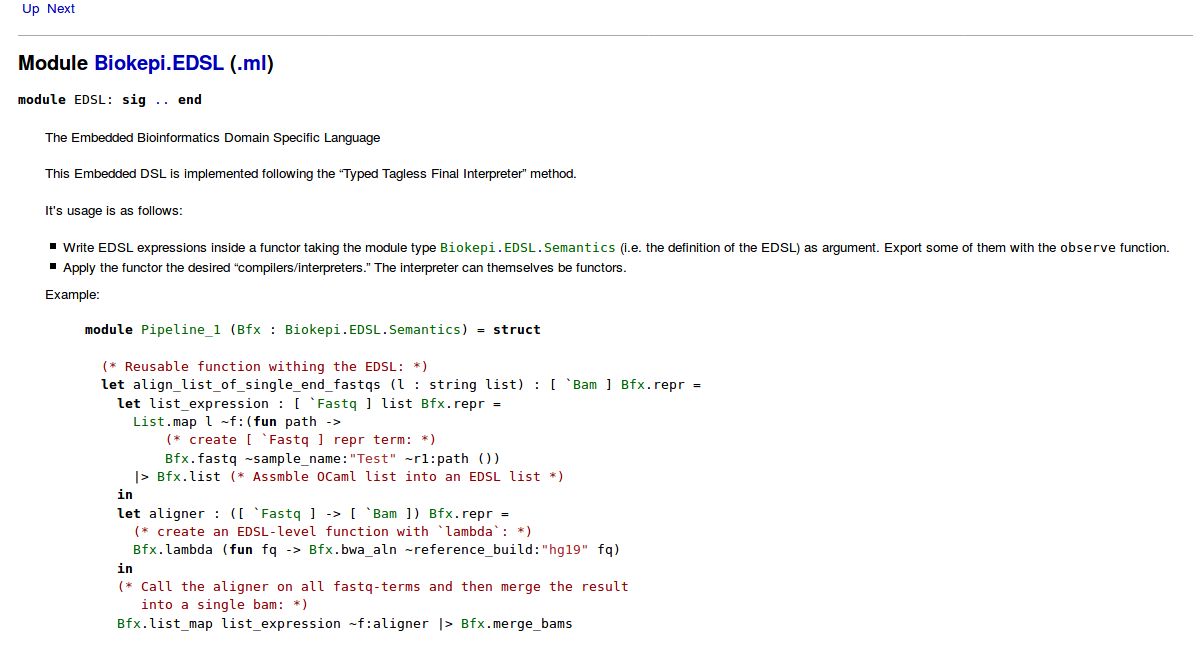
We TTFI-ed Everything
And it's more powerful:
- More constructs:
lambda/apply, list and pair functions, … - Easier to document.
- Easier to maintain.
- Extensible by the users.
And keeps growing:
$ grep 'val ' src/pipeline_edsl/semantics.ml | wc -l
60First, Quickly, With GADTs
Type Constraints + Existential Types:
type _ t =
| Int: int -> int t
| True: bool t
| False: bool t
| Equal: 'a t * 'a t -> bool t
let rec eval: type v. v t -> v =
function
| Int i -> i
| True -> true
| False -> false
| Equal (a, b) -> (=) (eval a) (eval b)
let () = assert (eval (Int 42) = 42)
let () = assert (eval (Equal (True, (Equal (Int 42, Int 42)))) = true)TTFI
Type Constraints + Existential Types, using module types and functors:
module type Symantics = sig
type 'a repr
val int: int -> int repr
val t: bool repr
val f: bool repr
val equal: 'a repr -> 'a repr -> bool repr
end
module Eval_ocaml : Symantics with type 'a repr = 'a = struct
type 'a repr = 'a
let int i = i
let t = true
let f = false
let equal a b = (a = b) (* Cheating a bit *)
endTTFI
Type Constraints + Existential Types, using module types and functors:
module Examples (EDSL: Symantics) = struct
let ex1 = EDSL.int 42
let ex2 = EDSL.(equal t (equal (int 42) (int 42)))
end
let () =
let module Compiled_examples = Examples(Eval_ocaml) in
assert (Compiled_examples.ex1 = 42);
assert (Compiled_examples.ex2 = true);
()TTFI :> Bullet Points
In OCaml:
- defintion of the language:
module type Semantics - program:
functor: Semantics -> whatever - compiler:
module implementing Semantics - optimization/transformation:
functor: Semantics -> Semantics - optimization framework: functor + GADT that implements “default behavior”
Mysteriously Useful Bit
More jargon: “observations” are useful artifacts of optimization passes:
module type Symantics = sig
type 'a repr
val int: int -> int repr
val t: bool repr
val f: bool repr
val equal: 'a repr -> 'a repr -> bool repr
type 'a observation
val observe: (unit -> 'a repr) -> 'a observation
endTo-String Compiler
module Eval_string
: Symantics with type 'a repr = string and type 'a observation = string
= struct
type 'a repr = string
let int = string_of_int
let t = "True"
let f = "False"
let equal a b = Printf.sprintf "(%s = %s)" a b
type 'a observation = string
let observe f = f ()
endTo-String Compiler
module More_examples (EDSL: Symantics) = struct
let ex1 =
let open EDSL in
observe (fun () -> int 42)
let ex2 =
let open EDSL in
observe (fun () ->
equal (equal t t) (equal (int 42) (int 43))
)
end
let () =
let module Compiled_examples = More_examples(Eval_string) in
Printf.printf "Ex1: %s\nEx2: %s\n%!"
Compiled_examples.ex1 Compiled_examples.ex2;
()Ex1: 42
Ex2: ((True = True) = (42 = 43))Simple Optimization Example
We can do some rewriting with functors:
module True_equal_true_true (Input: Symantics)
: Symantics with type 'a observation = 'a Input.observation
= struct
include Input
let t = Input.(equal t t)
end
let () =
let module Compiled_examples = More_examples(True_equal_true_true(Eval_string)) in
Printf.printf "Ex1: %s\nEx2: %s\n%!"
Compiled_examples.ex1 Compiled_examples.ex2;
()Ex1: 42
Ex2: (((True = True) = (True = True)) = (42 = 43))(this works without the 'a observation thing …)
Not Enough
For more complex/interesting transformations,
what we really want is to “match term with”:
type _ t =
| Int: int -> int t
| True: bool t
| False: bool t
| Equal: 'a t * 'a t -> bool t
let rec transform_equal_true_true : type v. v t -> v t = function
| Int i -> Int i
| True -> True
| False -> False
| Equal (True, True) -> True (* Optimization Pass ! *)
| Equal (a, b) ->
Equal (transform_equal_true_true a, transform_equal_true_true b)
let () =
assert (transform_equal_true_true (Equal (False, (Equal (True, True))))
= (Equal (False, True)))Optimization Framework
Some type-hackery later … A Generic Extensible Optimization Pass Generator.
module type Transformation_base = sig
type 'a from
type 'a term
val fwd : 'a from -> 'a term (* reflection *)
val bwd : 'a term -> 'a from (* reification *)
end
module Generic_optimizer
(X: Transformation_base) (Input: Symantics with type 'a repr = 'a X.from)
: Symantics with type 'a repr = 'a X.term
and type 'a observation = 'a Input.observation = struct
open X
type 'a repr = 'a term let int i = fwd (Input.int i)
let t = fwd Input.t let f = fwd Input.f
let equal a b = fwd (Input.equal (bwd a) (bwd b))
type 'a observation = 'a Input.observation (* Here we “get out” ! *)
let observe f = Input.observe (fun () -> bwd (f ()))
endUsing The Optimization Framework
So we want to do | Equal (True, True) -> True:
module True_true (Input: Symantics) = struct
module Transformation = struct
type 'a from = 'a Input.repr
type 'a term =
| Unknown: 'a from -> 'a term
| Equal: 'a term * 'a term -> bool term
| True: bool term
let fwd x = Unknown x
let rec bwd : type a. a term -> a from = function
| Unknown x -> x
| Equal (True, True) -> Input.t
| Equal (a, b) -> Input.equal (bwd a) (bwd b)
| True -> Input.t
end
module Language_delta = struct
let equal a b = Transformation.Equal (a, b)
let t = Transformation.True
end
include Generic_optimizer(Transformation)(Input)
include Language_delta
endUsing the Optimization Pass
Still just a functor to apply “in the chain:”
let () =
let module Compiled = More_examples(Eval_string) in
let module Optimized = More_examples(True_true(Eval_string)) in
Printf.printf "Compiled: %s\nOptimized: %s\n%!"
Compiled.ex2 Optimized.ex2Success!
Compiled: ((True = True) = (42 = 43))
Optimized: (True = (42 = 43))Extensions
Some include, and module sub-typing magic:
module type Symantics_with_lambdas = sig
include Symantics
val lambda : ('a repr -> 'b repr) -> ('a -> 'b) repr
val apply : ('a -> 'b) repr -> 'a repr -> 'b repr
end
module Eval_string_with_lambdas
: Symantics_with_lambdas
with type 'a repr = string and type 'a observation = string
= struct
include Eval_string
open Printf
let lambda f =
let var = sprintf "x%d" (Random.int 1000) in
sprintf "(λ %s → %s)" var (f var)
let apply f x =
sprintf "(%s %s)" f x
endUse The Extension
module Example_with_lambdas (EDSL : Symantics_with_lambdas) = struct
open EDSL
let l1 = lambda (fun x -> equal x t)
let ex1 = observe (fun () -> l1)
let ex2 = observe (fun () -> apply l1 (equal t t))
(* Of course still type checked:
let ex2 = observe (fun () -> apply l1 (int 42))
Error: This expression has type int repr
but an expression was expected of type bool repr
Type int is not compatible with type bool *)
end
let () =
let module Compiled = Example_with_lambdas(Eval_string_with_lambdas) in
Printf.printf "Ex1: %s\nEx2: %s\n%!"
Compiled.ex1 Compiled.ex2Ex1: (λ x370 → (x370 = True))
Ex2: ((λ x370 → (x370 = True)) (True = True))Extend The Generic Optimization Thing
Soooo meta:
module Generic_optimizer_with_lambdas
(X: Transformation_base)
(Input: Symantics_with_lambdas with type 'a repr = 'a X.from)
: Symantics_with_lambdas
with type 'a repr = 'a X.term
and type 'a observation = 'a Input.observation
= struct
open X
include Generic_optimizer(X)(Input)
let lambda f = fwd (Input.lambda (fun x -> bwd (f (fwd x))))
let apply e1 e2 = fwd (Input.apply (bwd e1) (bwd e2))
endExtend The Optimization Pass
True_true does not touch the new stuff:
module True_true_with_lambdas (Input: Symantics_with_lambdas) = struct
module Prev_true_true = True_true(Input)
include Generic_optimizer_with_lambdas(Prev_true_true.Transformation)(Input)
include Previous_true_true.Language_delta
end
let () =
let module Compiled = Example_with_lambdas(Eval_string_with_lambdas) in
let module Optimized =
Example_with_lambdas(True_true_with_lambdas(Eval_string_with_lambdas)) in
Printf.printf "Ex2 normal: %s\nEx2 optimized: %s\n%!"
Compiled.ex2 Optimized.ex2Ex2 normal: ((λ x20 → (x20 = True)) (True = True))
Ex2 optimized: ((λ x921 → (x921 = True)) True)Back To Biokepi
Fully replaced the GADT-based EDSL:
- Compiles to:
- Ketrew workflows.
- JSON “provenance proofs.”
- Display-friendly, high-level, Dot-graphs.
- Optimizations not that useful:
- In our application, it's mostly for display/readability purposes.
Example in Epidisco
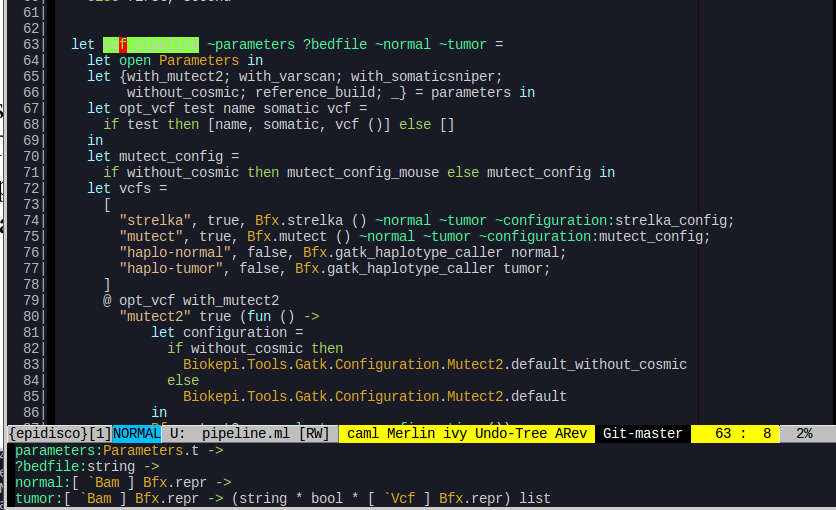
Apply Lambdas
From PR #236:
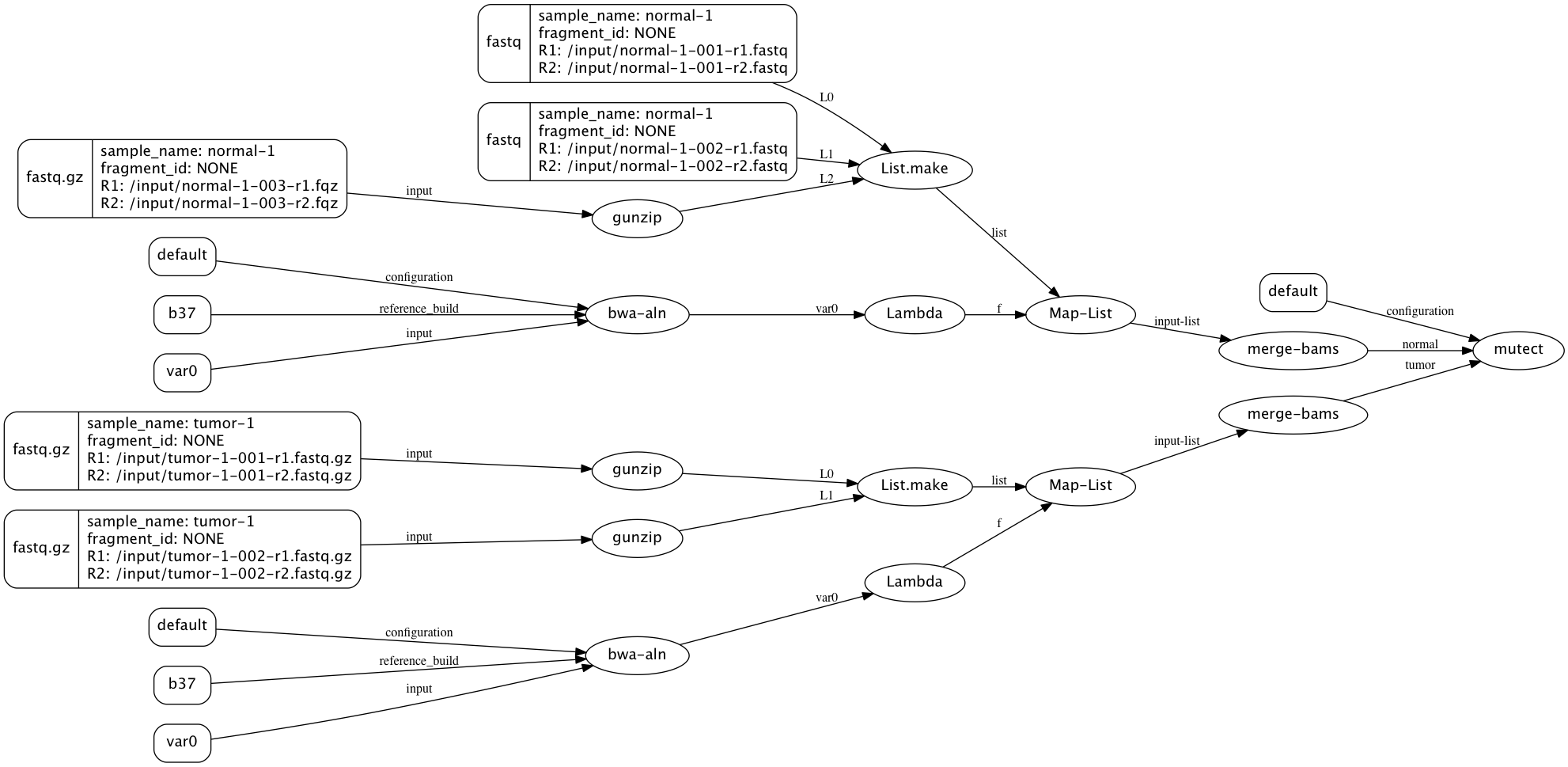
For A Nice Display
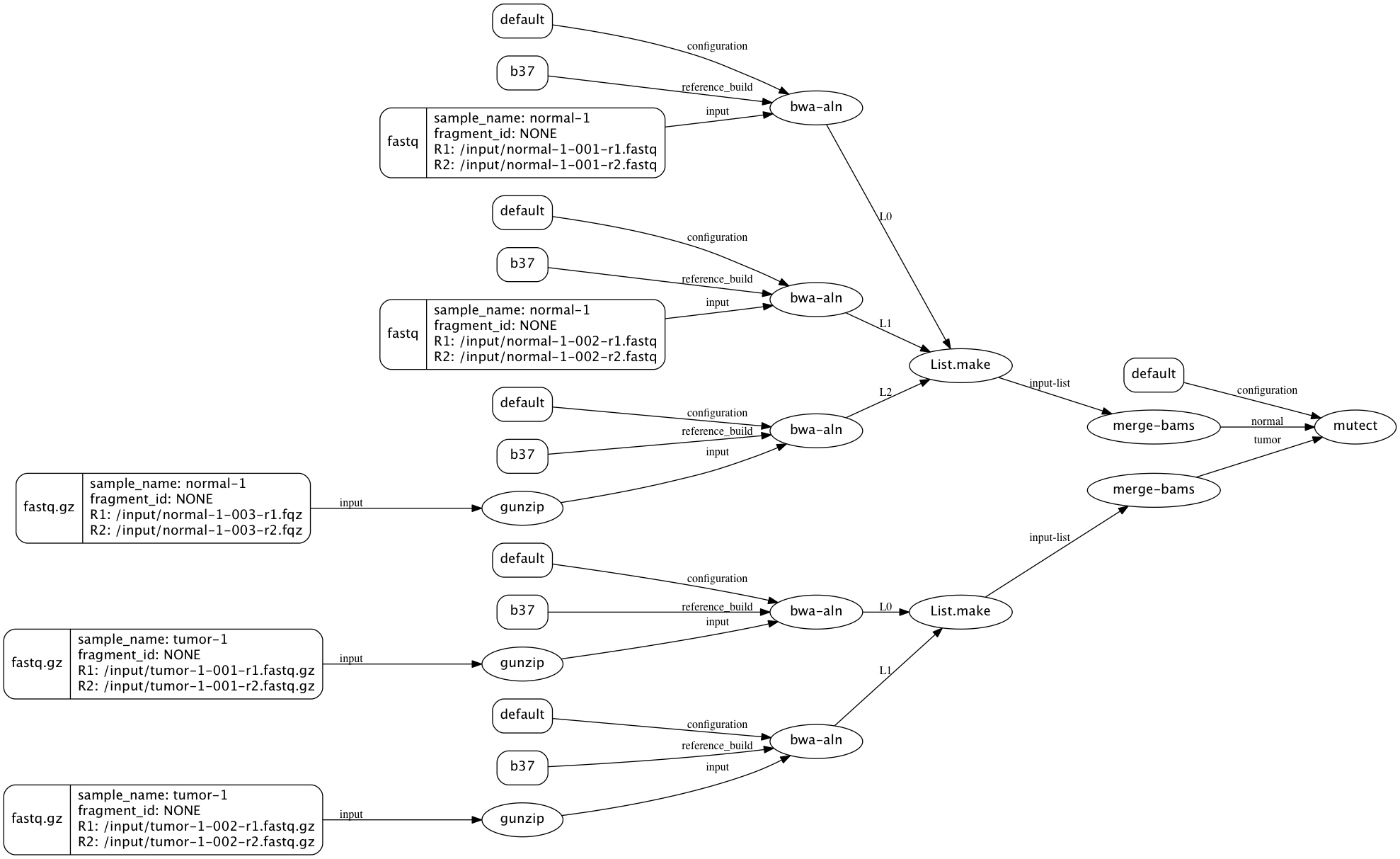
Epidisco
Big (family of) pipeline(s) that drive a clinical trial and other people's analyses:
hammerlab/epidisco/
Cf. output to dot-graphs:

We actually do extend the EDSL:
- Custom HTML “report.”
- Custom “saving” of important artifacts.
Zoom
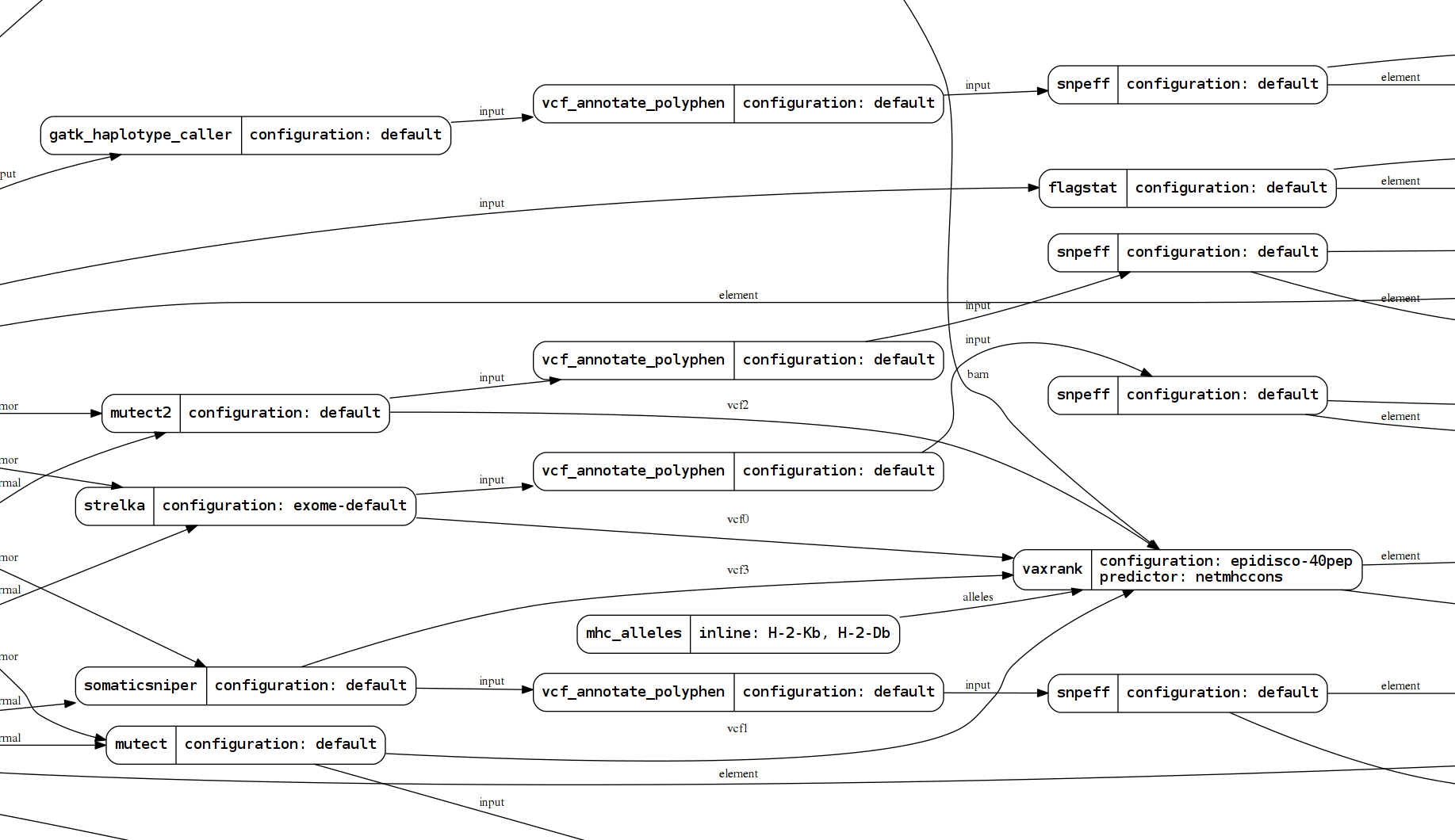
Deal With Insanity
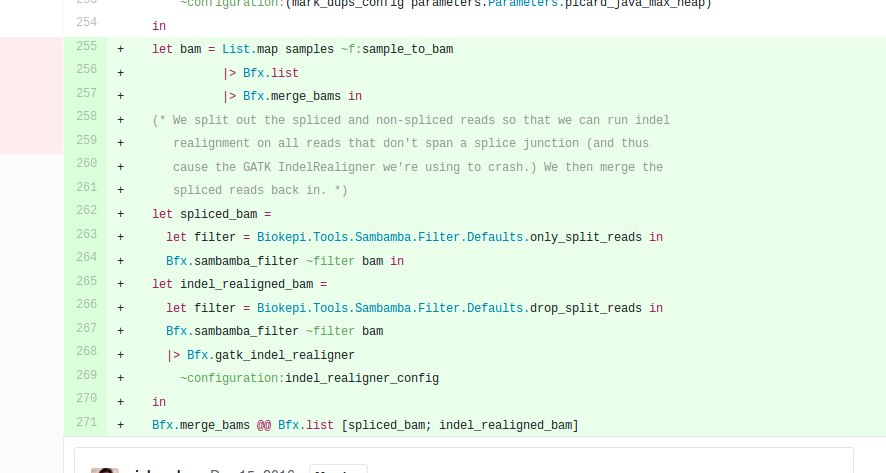
Limitations
Minor issues:
- Applying functors, while conceptually simple, scares beginners.
- Though they can → PR
#429.
- Though they can → PR
- Losing type variance because of the optimization framework.
- And in our case optimization framework is useful only for display.
- Cannot always use sub-modules because of
include.- Hence the flat/tagged API with
list_map,pair_first,pair_second, …
- Hence the flat/tagged API with
The End
Questions?
GADT Usages
- Existentials to “pack” types applied to different type parameters:
type pack = Deal_with_it: 'a * 'a how_to -> pack
- EDSLs ☺
- Generate POSIX-shell scripts & one-liners:
hammerlab/genspio - Tezos: 250-LoC mutually recursive GADT definition of a smart-contract language:
/src/proto/alpha/script_typed_ir.ml
- Generate POSIX-shell scripts & one-liners:
- Difference-lists:
- Cf.
Printf.printf. - Or
Eliom_service.create.
- Cf.
- Session types.